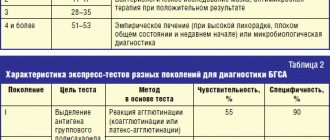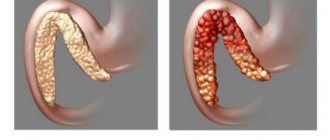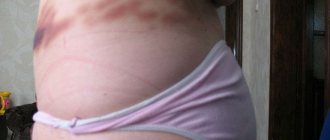The quality of feces, like the process of defecation itself, is an indicator of human health. Ideally, everything should happen every day, at approximately the same time, quickly and without causing discomfort.
Any inclusions in the stool - blood, mucus, undigested pieces of food - a change in color should alert the patient. If the temperature rises, vomiting occurs and the general condition worsens, self-medication and self-diagnosis are inappropriate.
A little about blood and diarrhea
Diarrhea is a signal of disruption of the gastrointestinal tract
Minor diarrhea without additional symptoms does not cause significant harm to human health. If 4 episodes of bowel movements have passed within 24 hours and the condition has returned to normal without drug therapy, then there is no need to worry.
The appearance of inclusions in stool is a reason to think and pay attention to your own health.
A small amount of blood is excreted in the feces. The norm is considered to be up to 4 ml per day. But the appearance of visible impurities or clots in feces is a sign of a pathological process. If additional symptoms are added, then you need to urgently contact a medical facility.
Treatment with traditional medicine
Many people wonder: how to get rid of hemorrhoidal bleeding at home? The initial stage of hemorrhoids is treated with traditional methods, so this approach is quite natural.
Healers achieve high efficiency in treating an unpleasant problem, practically guaranteeing a positive result from this approach. However, it is quite risky to use traditional methods without the supervision of a competent specialist.
It is better to use healers’ recipes as aids in professional therapy prescribed by a doctor.
The most popular folk methods are presented by the following recommendations:
- taking baths with a small amount of potassium permanganate solution for hemorrhoids;
- baths with the addition of infusion of chamomile and St. John's wort, mixed in a ratio of 1 to 1, in case of anal fissures;
- the use of microenemas with chamomile (30g of chamomile flower herb, brew with a glass of boiling water, cool, leave for 2 hours, insert into the anus using an Esmarch mug) for colitis, fissures, hemorrhoidal internal manifestations;
- if the patient has helminths, they are removed using a solution from onions: a chopped onion head is poured with warm boiled water overnight, filtered in the morning and the liquid is drunk on an empty stomach;
- you can get rid of tapeworm using the simplest available products - garlic and milk: you need to eat 10 heads of garlic and drink a glass of milk, and then, after 40 minutes, take a laxative (however, this method is not suitable for everyone);
- the use of tampons moistened with sea buckthorn oil (sea buckthorn is an effective anti-inflammatory and hemostatic agent) as lotions to the anus;
- to combat polyps in the intestines, use celandine: a decoction of the herb is used for enemas, and the infusion (1 to 4) is drunk 10-15 minutes before meals, in the morning;
- horseradish roots mixed with honey (1 to 1), take a teaspoon three times a day - also to eliminate polyps;
- orange peel boiled in boiling water will serve as an excellent remedy against bleeding: you can either eat the peel of the fruit or add sugar to the broth and drink in small portions, 3 times a day;
- A well-known hemostatic agent, nettle, will help stop severe bleeding: dry herb (30 g) should be brewed with boiling water (200 ml), cooled and taken three times a day, 1 tbsp. spoon, before eating.
Possible reasons
The appearance of impurities in feces always indicates pathological processes occurring in the body. Possible reasons:
- internal hemorrhoids;
- injury to the hemorrhoid during defecation;
- damage by pathogenic flora - such impurities in feces occur when infected with salmonella, the causative agent of dysentery;
- enteritis of various etiologies;
- colitis with the formation of areas of necrosis and ulceration;
- dysbacteriosis;
- ulcer in the upper gastrointestinal tract;
- carcinoma of the stomach, duodenum, other parts of the intestine, and rectum.
Examination of stool, examination by a proctologist, gastroenterologist, or surgeon will help make the correct diagnosis. During the examination, the doctor will take into account additional symptoms and the nature of bowel movements.
Blood color and diarrhea
When veins or clots of biological fluid appear, you need to pay attention to their color and quantity. During examination, this information is reported to the doctor, as this makes it possible to suggest the cause of the pathological process and speed up diagnosis.
| Color, quantity | Possible reason |
| Scarlet. | Injury. Haemorrhoids. Cracks in the anus, rectum. |
| Black, black clots. | Upper parts of the gastrointestinal tract. |
| Black in large quantities. | An open or perforated ulcer in the upper gastrointestinal tract. |
What measures to take
When blood is detected during bowel movements in women without pain, the patient’s well-being can be characterized by:
- semi-fainting states;
- severe, debilitating weakness;
- feeling of discomfort.
The same conditions are typical for men.
Without wasting time, the patient should be examined by a proctologist as soon as possible.
If a pregnant woman experiences bloody discharge from the anus, she should visit an antenatal clinic to find out the possible causes.
If blood leaks out of a child’s stool, the baby should be taken to a pediatrician and tests scheduled as soon as possible. The specialist will determine which doctors to refer the little patient to and what to do.
Basic actions when bleeding from the anus is detected:
- Immobilize the patient so that he is at rest.
- In case of continuous bleeding, apply a cold bandage to the anus and swallow ice (drinking water is prohibited).
- Washing with cold water.
- Compress (cold) on the bleeding area (to constrict blood vessels and stop blood loss).
- The use of drugs that stop blood loss: Etamzilat;
- Vikasol.
Mucus and blood in feces
Examination of stool will allow medical professionals to narrow down the list of possible causes of the disease. If, in addition to blood, mucus is found in the stool, this suggests:
- colitis with the formation of ulcers;
- neoplasm of malignant origin in the gastrointestinal tract;
- tuberculosis;
- Treponema pallidum infection;
- aggressive allergic reaction to food.
If you have this type of diarrhea, you should contact a medical facility. Taking a sufficient amount of fluid or using medications for rehydration is indicated on your own. You will have to give up food, at least for 1 day. This will reduce the load on the digestive organs.
Blood in vomit and stool
Diarrhea with blood is an alarming symptom
The appearance of such symptoms is not always a sign of damage to the gastrointestinal tract. What will the doctor suggest in this case:
- Poisoning, both food and pesticides, herbicides, household chemicals. The route of penetration of toxic substances can be inhalation or transdermal.
- Diseases of the nervous system.
- Infectious diseases - when additional symptoms appear and the temperature rises to 38 degrees.
- Rotavirus most often affects children, but adults are not immune from this pathogen. The temperature with rotavirus can reach critical values.
- Colitis - due to errors in nutrition. Accompanied by epigastric pain.
- Gastritis.
- Cholecystitis, pancreatitis, impaired motility of the bile ducts. These diseases, in addition to diarrhea with various impurities, are accompanied by nausea, vomiting, and a bitter taste in the mouth.
Nutrition for bleeding during bowel movements
If a person experiences the above symptoms, serious changes should be made to their diet:
- observe drinking regime;
- consume fermented milk products;
- increase the amount of cereals in the diet;
- give preference to black bread.
If constipation occurs, eat foods with a mild laxative effect:
- salads with beets;
- use pumpkin seeds in recipes;
- carrot salads;
- prunes and dried fruit compotes.
Green feces and blood
A change in the color of stool is an additional sign of the presence of a pathological process in the gastrointestinal tract. Possible reasons:
- food poisoning;
- consumption of foods with food dyes;
- in rare cases, this shade of stool is caused by excessive consumption of green leafy salads and vegetables;
- dysentery - accompanied by an increase in temperature, vomiting, and blood in the stool;
- metabolic disorders;
- increased hemoglobin level;
- intoxication with glandular preparations, overdose;
- microflora disturbance during antibiotic treatment. In this case, flatulence and epigastric pain occur.
Scarlet blood
Hemorrhoids are the cause of bleeding
The addition of bright scarlet blood to diarrhea is a sign of bleeding from the lower gastrointestinal tract. The doctor will suggest:
- fissures in the anus;
- the appearance of fistula tracts, paraproctitis;
- damage to hemorrhoids;
- the presence of malignant neoplasms in the rectum, large intestine;
- erosion of various origins;
- perforation of the ulcer.
Depending on the intensity and volume of bleeding, the patient may complain of dizziness, weakness, and pain. As a rule, the temperature does not rise.
Oncology
Malignant neoplasms in the gastrointestinal tract are increasingly diagnosed in people who have barely crossed the forty-year mark. Symptoms of the oncological process are varied. The release of blood during the act of defecation is far from the only, but an important sign that a serious malfunction has occurred in the body. Bleeding in a cancer patient is usually pronounced. The blood is not fresh and is dark brown in color.
If the patient does not receive treatment, or the tumor has reached the final stages of development, the contents of the intestine are supplemented with purulent inclusions, blood, mucus and even decaying tumor tissue. The patient's feces become ribbon-like and black in color. If a man, in whose stool blood was found, becomes weak, loses appetite, complains of a persistent feeling of fullness of the stomach, bloating and pain in the epigastric region, you should immediately make an appointment with a therapist and oncologist.
People who are faced with an oncological process in the intestines often experience a false urge to defecate
Antibiotics and blood in stool
Defecation disorders are a common side effect of taking antibiotics. Most often, such troubles arise during treatment with 1st and 2nd generation drugs.
Modern drugs injure the mucous membranes of the gastrointestinal tract to a lesser extent, rarely provoke excessive gas formation, and treat beneficial microflora more humanely.
If diarrhea develops during treatment, you should inform your doctor. If diarrhea is relieved by taking probiotics, then therapy is continued. If any inclusions appear in the stool, there is a possibility of damage to the mucous membranes of the stomach and intestines. In this case, the drugs are discontinued.
When treated with several types of antibiotics, the microflora is completely destroyed. But there is a risk of developing a representative of the opportunistic clostridia flora.
This microorganism is insensitive to antibacterial agents. In this case, pus and blood clots are present in the stool. There may be up to 20 episodes of bowel movements during the day.
If such symptoms appear, the main treatment is reviewed and drugs to suppress clostidia are added.
How to prepare for the examination?
The own research of specialists from the proctology department of the Altermed clinic made it possible to make a visit to a proctologist as easy and comfortable as possible. There is no longer any need to fast the day before and plan the procedure for the morning. In the proctology departments of Altermed, a way has been found to successfully cope with all these difficulties. This is Microlax bowel preparation.
The use of Microlax microenemas makes fasting unnecessary, does not require special equipment or premises, and saves a lot of time. The laxative effect occurs 5-15 minutes after administration of the drug. The quality of bowel cleansing is such that treatment can begin immediately after rectoscopy and anoscopy. If it is necessary to use during pregnancy and lactation, Microlax does not require special precautions.
The Proctology Clinic provides diagnostics using the most modern equipment. The best doctors in St. Petersburg - both men and women - and a delicate approach are at your service.
Alcohol and bloody diarrhea
Blood in stool can be secretive
Excessive consumption of alcoholic beverages negatively affects the condition of all organs. But the gastrointestinal system suffers first.
Ethanol is a toxin. It affects the cells of the mucous membranes of the mouth, esophagus, and stomach. In addition, the main cause of inflammatory processes in the pancreas is excessive or frequent consumption of strong drinks.
Therefore, the appearance of blood clots in stool is not uncommon after heavy drinking. Often there are additional symptoms - nausea, vomiting, temperature rise to critical values. In this case, you should call an ambulance.











